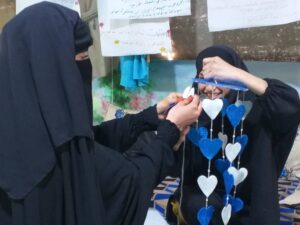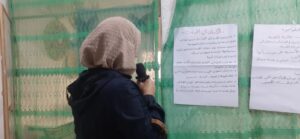Executive Summary
Education in Northeastern Syria (NES) has been one of its most controversial topics. Since it announced itself in 2014, the Autonomous Administration (AA) has attempted to assert its influence within society through the education system. The AA asserts the right of ethnic groups to be educated in their mother tongue but this raises a number of problems regarding the use of multiple curricula in Northeast Syria with particularly severe consequences for the degrees and diplomas given to students. The education system also heightens awareness of the social and political division, throwing into doubt the validity and future of the educational process and the fate of students, especially those with preparatory and secondary degrees. The future of the education administration is also worthy of analysis, in particular the training of the workforce in Kurdish and Syriac.
The problem of education in Northeast Syria has transformed into an arena of political competition between various sides. It is a source of anxiety for families of the students, as many parents are hesitant to send their children to the schools belonging to the Autonomous Administration as a result of fears regarding the legitimacy of the degrees and diplomas awarded. Unlike the schools belonging to the Autonomous Administration, Government of Syria (GoS) schools are overflowing with students, with 75 to 80 students are crowded into a classroom. This is in addition to the lack of a proper educational environment in those schools at the most fundamental level.
Direct interviews with specialists in education, along with interviews of families of students and education officials, have provided a deeper understanding of the nature of the problems facing the independence of education in NES. This includes the opportunities to reach a deal that leads to an agreement over a unified curriculum and which provides legitimacy to diplomas and degrees, reducing the ideological aspects in the curricula of both the GoS and the Autonomous Administration. It involves finding solutions for those involved in the educational process in Northeast Syria, namely administrators and teachers, including the retraining of the education workforce. Most important is finding a solution to the question of multilingual curricula whereby the administration insists on teaching children in their native tongue and Damascus refuses education in any language except Arabic, and to increase the amount spent on education. The education system in its current form needs urgent solutions to distance itself from politics.
This paper focuses on the areas with a Kurdish majority and those that are multi-ethnic, where government institutions operate alongside those of the Autonomous Administration. At a later stage, we will focus on the areas of Deir Ezzor and Raqqa to provide a more complete picture of the educational system.
Recommendations
Increase spending on education and its share of the general budget
It is not known how much is budgeted and spent on schools, teachers, and the education system as a whole because the Autonomous Administration has not revealed its overall budget nor the share of the budget dedicated to education. However, all schools under the control of the Autonomous Administration are facilities belonging originally to the Syrian government. The Autonomous Administration has not built any schools, institutes, or universities, and has not developed the infrastructure of those schools, including playgrounds, halls, sports facilities, or parks within the school, or developed laboratories, etc.
Distance education from political and ideological disputes, and agree on a unified curriculum
There is no alternative to ensuring national recognition of the curriculum, given the lack of clarity regarding the political future of the area as it stands now. The education portfolio should not be a part of the political and ideological struggle. Scientific subjects like math, physics, and chemistry in particular must be separated from political disputes.
An agreement over a unified curriculum will necessarily mean writing internal regulations for the education system, as well as clarifying the mechanism for evaluating teachers who do not have a university degree in order to benefit from their accumulated experience. The local community is not concerned with the policies of local governance structures that cannot get any international or regional recognition for degrees issued by their educational bodies.
Work to retrain the education workforce of the Autonomous Administration
A neutral, non-partisan, special committee of qualified individuals should be formed to address the challenge in this field. Utilizing the accumulated educational experience in the area will benefit the system at large. The committee should divide teachers into three segments: 1) Those with preparatory and secondary degrees. 2) University students who have not yet completed their studies, and can be divided into two groups: Students of education, literature, and science should be treated separately from those who have studied engineering or other fields that are not directly related to education. 3) Students of Rojava University who graduated after just two years of study.
Those who graduated from Syrian institutes and universities should be allowed to remain in the education sector. The other three groups should be treated according to their experience, academic knowledge, and knowledge of teaching methods. They should be either sent for further training, employed within the education sector, or sent away from the education sector to work elsewhere.


